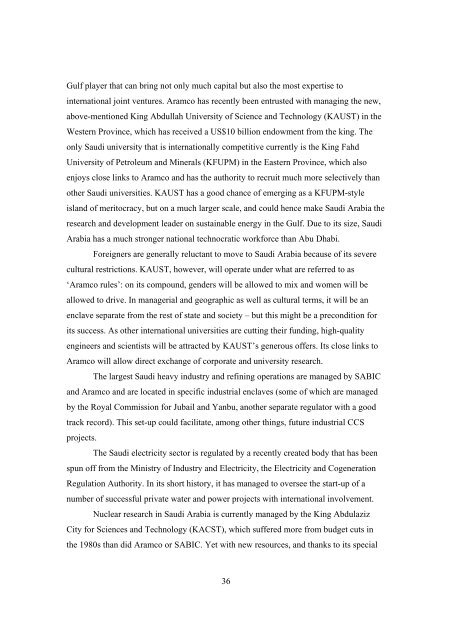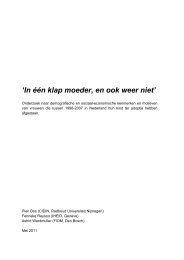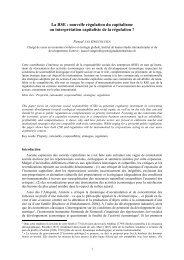PDF - Graduate Institute of International and Development Studies
PDF - Graduate Institute of International and Development Studies
PDF - Graduate Institute of International and Development Studies
Create successful ePaper yourself
Turn your PDF publications into a flip-book with our unique Google optimized e-Paper software.
Gulf player that can bring not only much capital but also the most expertise to<br />
international joint ventures. Aramco has recently been entrusted with managing the new,<br />
above-mentioned King Abdullah University <strong>of</strong> Science <strong>and</strong> Technology (KAUST) in the<br />
Western Province, which has received a US$10 billion endowment from the king. The<br />
only Saudi university that is internationally competitive currently is the King Fahd<br />
University <strong>of</strong> Petroleum <strong>and</strong> Minerals (KFUPM) in the Eastern Province, which also<br />
enjoys close links to Aramco <strong>and</strong> has the authority to recruit much more selectively than<br />
other Saudi universities. KAUST has a good chance <strong>of</strong> emerging as a KFUPM-style<br />
isl<strong>and</strong> <strong>of</strong> meritocracy, but on a much larger scale, <strong>and</strong> could hence make Saudi Arabia the<br />
research <strong>and</strong> development leader on sustainable energy in the Gulf. Due to its size, Saudi<br />
Arabia has a much stronger national technocratic workforce than Abu Dhabi.<br />
Foreigners are generally reluctant to move to Saudi Arabia because <strong>of</strong> its severe<br />
cultural restrictions. KAUST, however, will operate under what are referred to as<br />
‘Aramco rules’: on its compound, genders will be allowed to mix <strong>and</strong> women will be<br />
allowed to drive. In managerial <strong>and</strong> geographic as well as cultural terms, it will be an<br />
enclave separate from the rest <strong>of</strong> state <strong>and</strong> society – but this might be a precondition for<br />
its success. As other international universities are cutting their funding, high-quality<br />
engineers <strong>and</strong> scientists will be attracted by KAUST’s generous <strong>of</strong>fers. Its close links to<br />
Aramco will allow direct exchange <strong>of</strong> corporate <strong>and</strong> university research.<br />
The largest Saudi heavy industry <strong>and</strong> refining operations are managed by SABIC<br />
<strong>and</strong> Aramco <strong>and</strong> are located in specific industrial enclaves (some <strong>of</strong> which are managed<br />
by the Royal Commission for Jubail <strong>and</strong> Yanbu, another separate regulator with a good<br />
track record). This set-up could facilitate, among other things, future industrial CCS<br />
projects.<br />
The Saudi electricity sector is regulated by a recently created body that has been<br />
spun <strong>of</strong>f from the Ministry <strong>of</strong> Industry <strong>and</strong> Electricity, the Electricity <strong>and</strong> Cogeneration<br />
Regulation Authority. In its short history, it has managed to oversee the start-up <strong>of</strong> a<br />
number <strong>of</strong> successful private water <strong>and</strong> power projects with international involvement.<br />
Nuclear research in Saudi Arabia is currently managed by the King Abdulaziz<br />
City for Sciences <strong>and</strong> Technology (KACST), which suffered more from budget cuts in<br />
the 1980s than did Aramco or SABIC. Yet with new resources, <strong>and</strong> thanks to its special<br />
36




